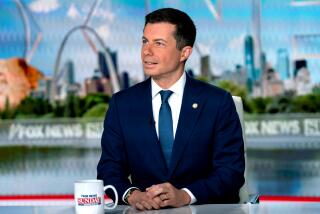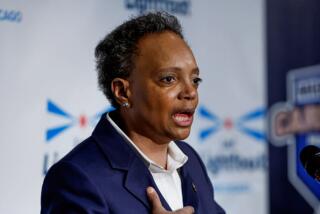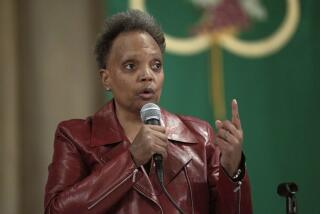Column: Pete Buttigieg has everything except positions on major issues
- Share via
Reporting from Washington — Pete Buttigieg, the 37-year-old mayor of South Bend, Ind., could turn out to be the biggest, boldest surprise of the 2020 presidential campaign. But he’d better come up with some policies first.
Buttigieg was virtually unknown outside his home state until two months ago, but he has surged into third place in polls in Iowa and New Hampshire, the states that hold the first contests in the race for the Democratic nomination.
Television anchors have learned how to pronounce his Maltese last name (“boot edge edge,” he says). Studious voters have read up on his biography: Midwestern boy goes to Harvard, wins a Rhodes scholarship, becomes his hometown’s mayor, serves in Afghanistan — then comes out as gay and acquires a husband.
He’s impressive on television, a fluent mix of Democratic talking points wrapped in moderate Midwestern tones — plus, as my colleague Mark Z. Barabak wrote, a “Mr. Rogers haircut and Howdy Doody grin.”
Buttigieg acknowledges that it’s “audacious” for the thirtysomething mayor of a town of 102,000 to seek the presidency. Actually, it’s unprecedented. The last mayor to win a nomination was New York’s DeWitt Clinton in 1812. And he lost in the general election.
His pitch is mostly his biography. He’s a millennial, he points out often in an unsubtle contrast to older candidates.
“I come from the generation that is going to be on the business end of climate change as long as we live,” he said in his announcement speech on Sunday.
He argues that as a Rust Belt mayor who has won votes from Trump supporters, he could be the “electable” candidate Democrats yearn for.
Maybe. There’s only one element missing from Buttigieg’s potentially meteoric campaign: positions on major issues.
That’s not an accident. He says voters aren’t looking for policy papers. They care about values and character, and knowing that a candidate cares about their lives.
He’s partly right. Hillary Clinton’s 2016 presidential campaign offered so many policy proposals that they got in the way of a broader message.
But many voters already ask Buttigieg what he would do if elected.
At a CNN town hall last month, voters asked his views on healthcare, unemployment, veterans’ benefits, climate change and whether technology companies like Facebook should be regulated.
His answers were a blend of generic Democratic positions and suggestions that more venturesome ideas should be considered.
On healthcare, Buttigieg says he believes the United States should “move in the direction of a ‘Medicare for all’ system,” but only gradually — not the immediate change to a government-run system proposed by Bernie Sanders.
On taxes, he argues that Trump’s tax cuts for higher-income earners should be reversed. He also supports a wealth tax and a financial transaction tax — but he hasn’t offered specific proposals.
Like every Democratic candidate, he supports “comprehensive immigration reform,” but he hasn’t offered proposals for stemming the surge of asylum seekers to the border — or explained how he’d get reform through Congress that has repeatedly rejected it.
On Facebook, he says the increasing power of big corporations is “probably the biggest challenge for America right now,” but he stops short of calling for those companies to be broken up, as Sen. Elizabeth Warren (D-Mass.) has proposed.
“It’s not how big they are; it’s how they act,” he said. “And that’s the thing I think we need to be regulating.”
Buttigieg does have two proposals of his own. He’s called for electing the president by popular vote, a change that would require amending the Constitution, never an easy prospect.
And he’s proposed expanding the Supreme Court from nine justices to 15, but adds that it’s “not necessarily the right option.” It’s not even a new option: President Franklin D. Roosevelt proposed expanding the court to 15 justices in 1937, naming all the new ones himself, but the Senate knocked it down.
The sum of his statements puts Buttigieg somewhere in the middle of the spectrum of Democratic candidates, between Sanders and Warren on the left and Joe Biden (still unannounced) in the center. But without details, it’s impossible to place him precisely — and he appears to like it that way.
Will that be enough for primary voters, who often have favorite issues and want to pin each candidate down? Probably not. Buttigieg will face pressure to get specific before the first Democratic debate in June.
Cynics will point out that he is only the latest Democratic hopeful to occupy third place behind Biden and Sanders — the “flavor of the month,” as he has put it. In February, it was Kamala Harris; in March, Beto O’Rourke; next month, perhaps, Michael Bennet of Colorado.
That rapid rotation suggests that Democratic voters are still searching for the perfect new face.
And Buttigieg faces daunting challenges. He’s never run a successful statewide campaign, let alone a national effort. He’s a gay man whose husband joins him at campaign events; they’re hoping to shatter a barrier that’s never been tested before.
But he’s already defied the odds. He’s proven himself to be a man to watch. Now come the hard parts.
More to Read
Get the L.A. Times Politics newsletter
Deeply reported insights into legislation, politics and policy from Sacramento, Washington and beyond. In your inbox three times per week.
You may occasionally receive promotional content from the Los Angeles Times.











